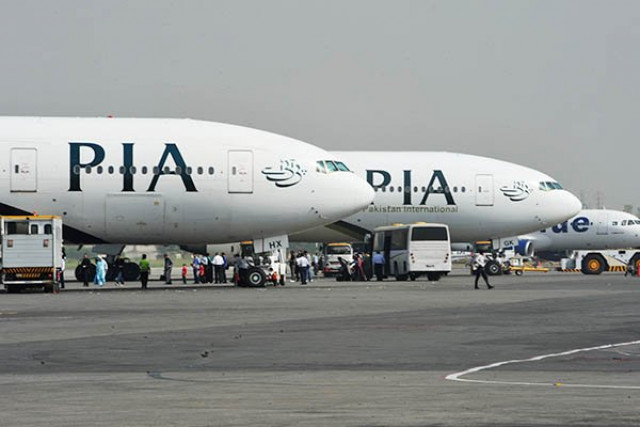Shedding losses: PAC partially endorses PIA privatisation plan
Parliamentary panel avoids job losses question, approves Rs288b bailout.

PHOTO: AFP
A parliamentary watchdog found it easier to endorse the idea of a record Rs288 billion bailout to Pakistan International Airlines than laying off 7,000 workers that the national carrier does not need.
At a meeting of the National Assembly’s Public Accounts Committee on Tuesday, the PAC endorsed the Aviation Division’s proposal for the government to absorb Rs288 billion in PIA’s liabilities onto its own balance sheet, which is tantamount to giving the airline a bailout larger than any other in Pakistani history. PIA’s debts currently cost the airline Rs36 billion a year in interest costs alone.
Yet, even as it approved the backdoor bailout, the PAC could not get itself to approving the other part of the Aviation Division’s privatisation plan, which calls for non-core functions of the airline to be spun off into a separate company, a move that would likely result in 7,000 employees – 40% of PIA’s workforce – being let go, but would save the airline Rs5.5 billion in extra expenditures each year.
PIA’s non-core activities include ground handling, technical support, flight kitchen, maintenance and repair as well as running the courier service Speedex. This extensive portfolio of activities is typically not part of the offerings of global airlines, said Muhammad Ali Gardezi, the aviation secretary, in response to questions raised by PAC members.

Gardezi said that PIA’s privatisation plan calls for the separation of the core business of the airline – passengers and cargo – and the non-core businesses, which would trim Rs5.5 billion in expenses each year. The plan has yet to be approved by the PIA board of directors. With 18,338 employees, PIA has one of the highest employee-aircraft ratios in the world of 690. The average ratio worldwide is around 150 employees per aircraft.
Gardezi said PIA also asked the federal government to absorb its outstanding liabilities worth Rs288 billon. He said as long as these liabilities are serviced by the airline, it cannot become profitable.
The new business plan is in line with the Privatisation Commission’s strategy that seeks to separate losses from the books of state-owned aimed at selling a clean balance sheet to the potential buyers. The government has given written assurances to the International Monetary Fund that a minimum of 26% shares of PIA will be sold by the end of this year along with management control.
PIA Managing Director Shahnawaz Rehman told PAC that the airline was expecting Rs27 billion losses for the financial year that ended on December 31, 2014, down from Rs43 billion in the previous year. Sliding fuel prices played a major role in the lower losses, as the airline’s fuel bill came down to Rs46 billion, a Rs9 billion saving over previous year.
The managing director said these results were subject to a final report by the auditors, who have not yet compiled the audited results. Even in 2015, PIA would not be profitable, as management anticipates a Rs10 billion loss for the year.
PAC Chairman Khursheed Shah was quick to back the PIA’s move of shifting its past liabilities onto the government’s books. Shah’s Pakistan Peoples Party restored over 5,000 employees with backdated benefits in 2009 when it was in office.
This move put an additional annual burden of Rs6.5 billion on the airline, increasing its salary bill by 49.4%, according to federal auditors. In the same year, the numbers of the PIA’s executives increased 100% to 4,341 despite the airline running deep losses, said Director General Commercial Audit.
Gardazi said under the proposed business plan, the management wanted to replace A-310 aircraft with A330 and A350 fleet.
Published in The Express Tribune, February 25th, 2015.





1733130350-0/Untitled-design-(76)1733130350-0-208x130.webp)











COMMENTS
Comments are moderated and generally will be posted if they are on-topic and not abusive.
For more information, please see our Comments FAQ